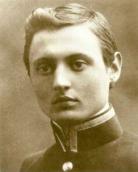Juri Klen
Juri Klen – literary alias of the Ukrainian poet Oswald Burghardt (October 4, 1891 – October 30, 1947).
The future poet was born in the village in Vinnytsia region in the family of a German merchant. He finished in Kiev (1911) and entered the Faculty of Philology , where he participated in the seminar prof. V. M. Peretz.
In 1914, with the outbreak of World War I, O. B. was deported to the Arkhangelsk province as an ethnic German. After the fall of tsarist rule in Russia (1917), he returned first to Kursk, and at the turn of 1918/9 – to Kyiv.
In Kyiv (1919 – 1920) and further in (autumn 1920 – mid 1922) O. B. meets and associates with Ukrainian figures – literary critic , poets Mykola Zerov, Pavel Filippovich and others. These acquaintances had a decisive influence on the formation of O. B. as a Ukrainian poet.
In the summer of 1921, the criminal Moscow authorities arrested O. B. in Baryshivka and sent to prison in Poltava. O. B. was released due to the intervention of the Russian writer V. G. Korolenko (then, at the beginning of the criminal regime, similar cases still happened).
In Kyiv O. B. taught at various educational institutions, simultaneously translated European poets into Ukrainian, and, in addition to those named, also made friends with Mikhail Dray-Khmara and Maxim Rylsky, the so-called "neoclassics."
In late 1931 O. B. managed to leave the Moscow "socialist paradise" in Germany, and therefore did not die in the Moscow torturehouses, like most "neoclassics." In Germany, he stayed out of work for a while, teaching at the University of Münster since 1934. In 1941 – 1943 he served in the German army (translator at the headquarters of the 17th Army) and again visited Ukraine. After his demobilization, he taught at various high schools and took an active part in the literary life of the community of Ukrainian "displaced persons" in Germany (1945 – 1947). He died in Augsburg.
O. B.’s literature creativity began in 1913 with poetry written in Russian. He wrote Russian poems until 1922, and from 1924 began to write Ukrainian poems. In the 1930s he also wrote poems in German.
From 1934 O. B. began to use a literary alias Juri Klen, which has earned the well-deserved glory.
In 1937, Ju. K. published a poem "Cursed years" with a sharp condemnation of Moscow terror in Ukraine. He exposed the same theme with even greater scope in the poem "The ashes of empires" (1943 – 1947, left unfinished), in which scenes of Hitler’s genocide were unfolded in parallel with the pictures of the Moscow genocide in Ukraine.
The Moscow authorities were well aware that Juri Klen was their systematic enemy. In Ukraine, under the Moscow occupation, his name was completely banned. The only collection of works in 4 volumes (far from completness) has been published in the free world, Canada (1957-1992).
Unfortunately, the situation in independent Ukraine has not improved. The works of Ju. K. were not printed even in such a limited form as in the mentioned collection, and are now available to readers in our e-reprint.
The manuscript heritage of Ju. K. was not identified, described, or collected; his literary studies have not been collected or reprinted (from those we can provide readers only an article " 1927). Poetical translations by Ju. K. are not reprinted in full.
Biographical sources and memoirs of the poet have not been collected, no monographic studies have been written about his life and work, and the authors of articles written on occasion do not always show a deep insight into his work.
In Kyiv, to which Juri Klen has devoted many inspirational lines, the is named after him (however, little is known about its existence).
M. Zh., November 10, 2019.

